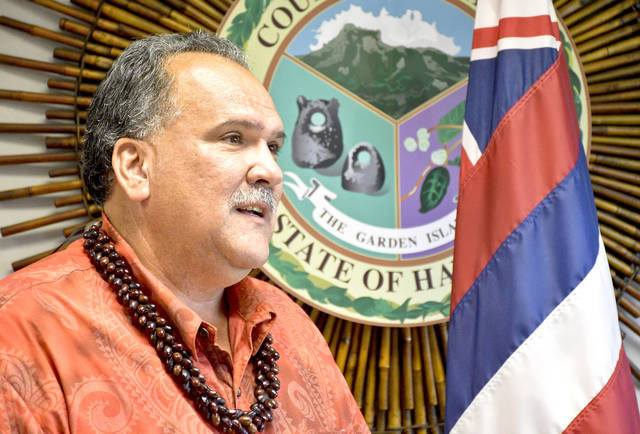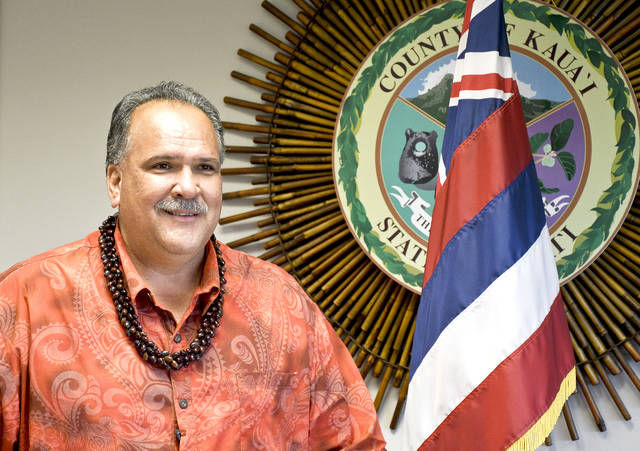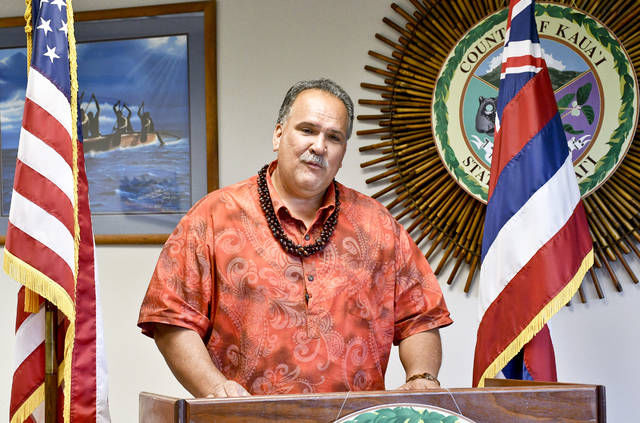LIHUE — Mayor Bernard Carvalho Jr. said the newest version of fiscal year 2017-2018 budget does not adequately prepare the county for a sustainable future. He said it ignores two resolutions — one for a structurally sound budget, and one
LIHUE — Mayor Bernard Carvalho Jr. said the newest version of fiscal year 2017-2018 budget does not adequately prepare the county for a sustainable future.
He said it ignores two resolutions — one for a structurally sound budget, and one for a reserve fund in which 30 percent of the previous year’s funds are placed. Both were passed in March.
“I am concerned that we do not have a joint commitment to the long-term financial stability of this county,” Carvalho said during a press conference Friday to explain why he doesn’t support the council’s budget.
That’s why he sent the budget — which was approved 6-1 by the Kauai County Council, with Councilwoman JoAnn Yukimura the dissenting vote — back to the council unsigned.
“The council’s decision was both surprising and frustrating, given our shared progress over the past two years to commit to a long-term financial plan that would seek to better the financial stability of this county beyond the current fiscal year,” Carvalho said.
Carvalho said his administration has been working with the council and the Government Finance Officers Association to analyze the county’s financial situation for the last two years.
The GFOA suggested the county reserve between 27 and 41 percent of the prior year’s revenues to mitigate its risks. It also recommended the county avoid drawing from the reserves, Carvalho said.
Mel Rapozo, council chair, said he doesn’t have “ill feelings” toward the mayor’s action.
“I fully respect the mayor’s decision to allow the budget to pass without his signature. That’s the process,” he said.
Councilman Ross Kagawa said the unsigned budget shows how a democracy works.
“The mayor felt that increased taxes are necessary, and we disagree with him,” he said.
The budget bill was submitted to the mayor on June 1, and he had 10 working days to either sign it, veto it or send it back without a signature.
Sending the budget back without a signature shows the administration is not in complete agreement with what was approved, said Ken Shimonishi, county finance director.
The budget, as it was approved by the council, will go into effect July 1, he said.
Originally, the proposed operating budget for fiscal year 2017-2018 was $204 million.
“The budget we presented did not come without challenge and sacrifice from each and every county department and division, as well as our citizens,” Carvalho said. “However, it did seek to improve our roadways, public facilities and services, accounted for the rise in personnel costs and benefits and maintained our shared promise of a 30 percent reserve.”
That initial proposal was brought down to $203.5 million in a supplemental budget submitted to the council on May 5.
The supplemental budget also included $800,000 in road maintenance projects and an increase in real property taxes for road repairs. That hike would have generated $3.6 million.
During the council’s budget meetings in May, the council passed a $201 million budget, rejecting the mayor’s proposed tax hike.
They voted to take the remaining $1.5 million they couldn’t cut from the reserve fund.
The mayor said the tax increase was necessary.
“Our proposed real property tax increase at 19 cents would have provided sufficient revenues to fund our expenditures. While the budget approved by council was balanced without tax increases or other meaningful revenue enhancements, this approach merely addresses one year of necessary expenses,” he said.
“Unlike the other three Hawaii counties, which all had the foresight to adopt property tax rate increases and other revenue enhancements for FY18, the County of Kauai will likely be forced to propose more radical tax rate increases to fund unavoidable costs due to collective bargaining and related benefits, heavy equipment and public safety vehicle replacement, deferred maintenance and debt service for FY19 and beyond.
“While the promise of not raising taxes sounds like an ideal political solution, it ignores the present and future financial realities of our county government,” Carvalho said.
While taking from reserve funds is a short-term solution, it delays putting the burden on residents, Rapozo said.
“Our families are struggling, many living paycheck to paycheck,” he said.
It’s important to remember that since fiscal year 2012, the surplus at the end of the year has been at least $11 million, Rapozo said.
“The truth of the matter is that we don’t spend our budgeted amounts, and at the end of the fiscal year, these funds lapse and get carried over into the reserve,” he said. “So as you can see, $1.5 million will be made up by the end of the fiscal year. Therefore, we don’t need to raise taxes.”
Council cuts to the budget also included $100,000 for performance audits and $504,000 from the auditor’s office.
Reducing road maintenance money was a key issue for the mayor.
“During my State of the County Address in March, I made a promise to the community that we would fix our roads. As such, our budget dedicated $6 million to this effort.
“We then learned in May that the state Legislature reduced the county’s share of its Transient Accommodations Tax revenues by $1.45 million. This required us to make additional adjustments, and thus we reduced the amount initially dedicated to our critical road maintenance and repairs need from $6 million to $4.8 million. After the council’s further reduction of $800,000, the amount now dedicated to this critical need is a mere $4 million,” he stated.
Carvalho said he decided not to veto the budget bill because he knew he wouldn’t get support from the council.
“Based upon the votes that would have to come forward, it wouldn’t make a difference,” Carvalho said. “I’m not into fighting just to fight. So this I felt was the right way to present how I felt and look at the overall situation.”
It takes five votes to override a veto.
“It is one of my goals as mayor to leave the County of Kauai in a better financial state than it was in the day I took office. We must create a financially sustainable future for the next generation of government leaders and the community they serve,” Carvalho said.
The county’s other five councilmembers, Yukimura, Mason Chock, Arthur Brun, Arryl Kaneshiro and Derek Kawakami, did not respond to TGI’s requests for comments.




